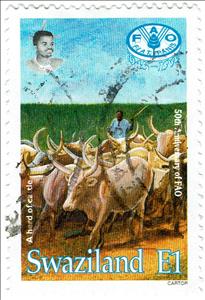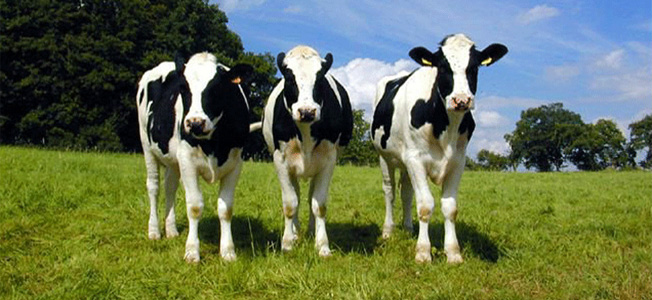Stamp: Herd of Cattle (Swaziland 1995)
Herd of Cattle (Swaziland 1995)
05 June (Swaziland ) within release 50th Anniv. of FAO goes into circulation Stamp Herd of Cattle face value 1 Swazi lilangeni
| Stamp Herd of Cattle in catalogues | |
|---|---|
| Michel: | Mi: SZ 650 |
| Stamp Number: | Sn: SZ 646 |
Stamp is square format.
Also in the issue 50th Anniv. of FAO:
- Stamp - Planting Vegetables face value 50;
- Stamp - Corn Harvest face value 35;
- Stamp - Sorghum Harvest face value 2;
- Stamp - Herd of Cattle face value 1;
Stamp Herd of Cattle it reflects the thematic directions:
Agriculture is the cultivation and breeding of animals, plants and fungi for food, fiber, biofuel, medicinal plants and other products used to sustain and enhance human life.[1] Agriculture was the key development in the rise of sedentary human civilization, whereby farming of domesticated species created food surpluses that nurtured the development of civilization. The study of agriculture is known as agricultural science. The history of agriculture dates back thousands of years, and its development has been driven and defined by greatly different climates, cultures, and technologies. Industrial agriculture based on large-scale monoculture farming has become the dominant agricultural methodology.
Cattle (Bos taurus) are large, domesticated, bovid ungulates widely kept as livestock. They are prominent modern members of the subfamily Bovinae and the most widespread species of the genus Bos. Mature female cattle are called cows and mature male cattle are bulls. Young female cattle are called heifers, young male cattle are oxen or bullocks, and castrated male cattle are known as steers.
Food is any substance consumed by an organism for nutritional support. Food is usually of plant, animal, or fungal origin and contains essential nutrients such as carbohydrates, fats, proteins, vitamins, or minerals. The substance is ingested by an organism and assimilated by the organism's cells to provide energy, maintain life, or stimulate growth. Different species of animals have different feeding behaviours that satisfy the needs of their metabolisms and have evolved to fill a specific ecological niche within specific geographical contexts.



